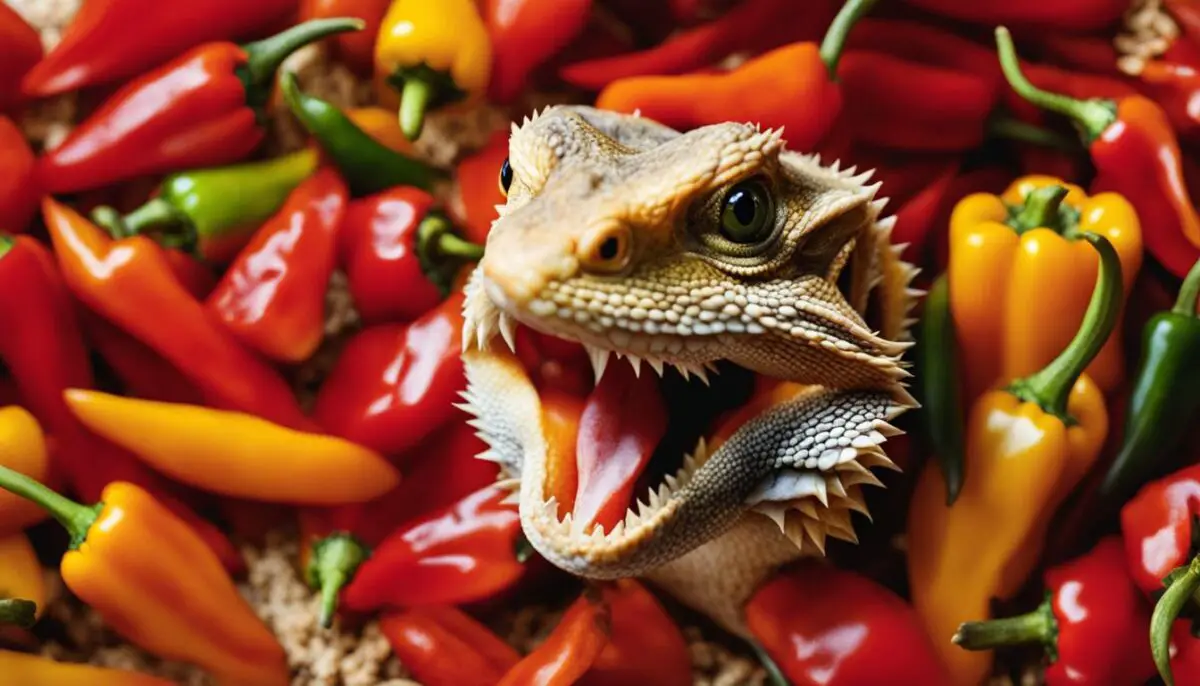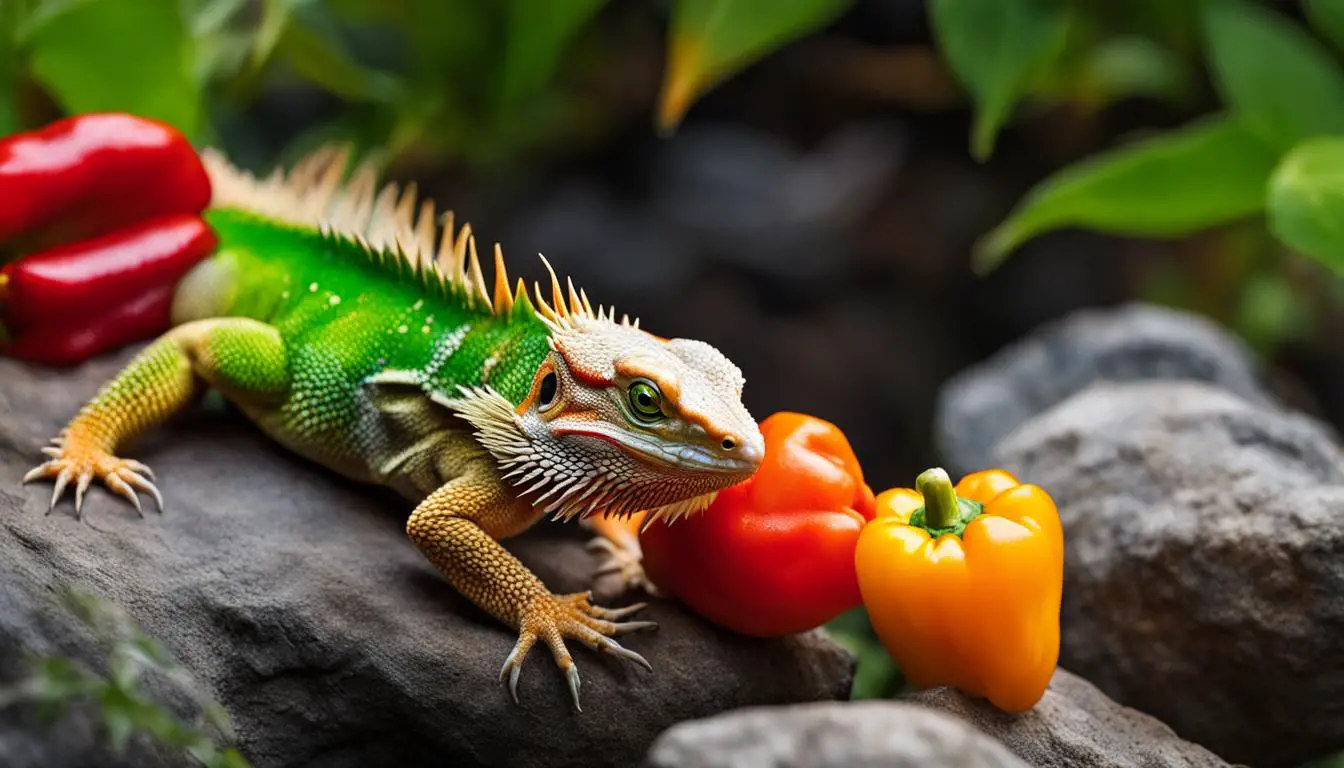Bearded dragons are fascinating reptiles known for their unique appearance and docile nature. As a responsible pet owner, it’s important to provide these creatures with a balanced diet that meets their nutritional needs. Understanding what foods are safe for bearded dragons is crucial to their overall health and well-being. In this article, we will explore the question: Can bearded dragons eat sweet peppers?
Key Takeaways:
- Bell peppers can be safely fed to bearded dragons, but in moderation.
- They provide essential nutrients such as vitamins A, C, B6, and E, as well as potassium and folate.
- Bell peppers should not be a staple vegetable in a bearded dragon’s diet due to their low calcium content.
- It is important to choose organic bell peppers, wash them thoroughly, remove the top, membranes, and seeds, and slice them into small pieces.
- Feeding bell peppers once or twice a week is sufficient to offer the nutritional benefits they provide.
Nutritional Profile of Bell Peppers
Bell peppers, particularly red ones, are highly nutritious and provide a variety of essential vitamins, minerals, and antioxidants for bearded dragons. Let’s take a closer look at their nutritional value:
| Nutrient | Amount per 100g |
|---|---|
| Vitamin A | 3131 IU |
| Vitamin C | 127.7 mg |
| Vitamin B1 (Thiamine) | 0.057 mg |
| Vitamin B2 (Riboflavin) | 0.085 mg |
| Vitamin B3 (Niacin) | 0.734 mg |
| Vitamin B5 (Pantothenic acid) | 0.099 mg |
| Vitamin B6 | 0.291 mg |
| Vitamin B9 (Folate) | 24 μg |
| Vitamin E | 0.60 mg |
| Vitamin K1 | 4.9 μg |
| Calcium | 9 mg |
| Copper | 0.076 mg |
| Iron | 0.34 mg |
| Magnesium | 10 mg |
| Manganese | 0.163 mg |
| Phosphorus | 20 mg |
| Potassium | 175 mg |
| Sodium | 5 mg |
| Zinc | 0.17 mg |
| Water content | 90% |
Bell peppers are a rich source of vitamins A and C, which are important for immune system health, vision, reproduction, and growth in bearded dragons. They also contain a range of B vitamins, including B6 and B9, which support red blood cell creation and healthy cell and tissue maintenance.
In addition, bell peppers provide minerals such as calcium, copper, iron, magnesium, manganese, phosphorus, potassium, sodium, and zinc, which are necessary for various bodily functions. However, it’s essential to note that while bell peppers contain calcium, the calcium to phosphorus ratio is not ideal for bearded dragons. Bell peppers have more phosphorus than calcium, which can hinder calcium absorption and potentially lead to health issues.
“Bell peppers are packed with essential vitamins, minerals, and antioxidants, making them a valuable addition to a bearded dragon’s diet. However, it’s vital to balance their consumption with other calcium-rich foods to ensure optimal health.”
Despite the high oxalate content of bell peppers, which can hinder calcium absorption, they still offer valuable nutritional benefits when included as part of a balanced diet for bearded dragons.

| Potential Risks and Considerations of Feeding Bell Peppers to Bearded Dragons |
|---|
| 1. Bell peppers should be the only type of pepper given to bearded dragons to avoid harmful effects. |
| 2. Only feed bell peppers once or twice a week as a treat, as they do not provide enough calcium to be a staple food. |
| 3. Excessive water from bell peppers can lead to diarrhea, so moderation is key. |
| 4. The potassium to calcium ratio in bell peppers is not ideal and can contribute to metabolic bone disease. |
| 5. Excessive vitamin A intake, especially when combined with vitamin A supplements, can lead to hypervitaminosis A. |
Feeding Recommendations and Tips
When it comes to feeding bearded dragons, bell peppers are a healthy vegetable option that can be included in their diet. Here are some recommendations and tips to ensure your bearded dragon gets the most out of this nutritious treat:
- Choose organic bell peppers: Opt for organic peppers to minimize exposure to pesticides, as non-organic ones may contain harmful chemicals.
- Thoroughly wash the peppers: Even if you have organic bell peppers, it’s important to wash them thoroughly to remove any traces of animal fertilizer that may be present.
- Remove the top, membranes, and seeds: Before serving bell peppers to your bearded dragon, cut off the top, remove the membranes and seeds. This helps eliminate any potential choking hazards and ensures they receive only the most nutritious parts of the pepper.
- Slice into small pieces: To make it easier for your bearded dragon to eat, slice the bell pepper into small, bite-sized pieces. This will promote safe and efficient ingestion.
- Add to salads or serve alone: Bell peppers can be a great addition to your bearded dragon’s salad. Alternatively, you can serve them alone as a standalone treat.
- Alternate with calcium-rich vegetables: While bell peppers provide various nutrients, they are low in calcium. It’s essential to alternate their consumption with other leafy greens and vegetables that are rich in calcium to ensure a balanced diet.
- Feed once or twice a week: To provide the benefits bell peppers offer without overdoing it, feed them to your bearded dragon once or twice a week. This frequency is sufficient to supply the nutrients while maintaining a varied diet.
By following these feeding recommendations and tips, you can ensure your bearded dragon receives the nutritional benefits of bell peppers while maintaining a balanced and healthy diet.
| Bell Peppers: Nutritional Highlights | Quantity per 100g |
|---|---|
| Vitamin A | 157 IU |
| Vitamin C | 128 mg |
| Vitamin B6 | 0.29 mg |
| Vitamin E | 1.58 mg |
| Vitamin K1 | 4.9 µg |
| Calcium | 10 mg |
| Phosphorus | 20 mg |
| Potassium | 211 mg |
| Sodium | 3 mg |
Note: Nutrient content may vary depending on the variety and color of bell peppers.
Benefits of Bell Peppers for Bearded Dragons
Despite their limitations as a staple food, bell peppers offer several benefits for bearded dragons. They contain antioxidants, which help support the immune system and aid in digestion. The vitamins A and C in bell peppers promote immune system function, vision, reproduction, and growth. Vitamin B6 assists in red blood cell creation, while vitamin E prevents inflammation and repairs damaged cells. Vitamin K1 is important for blood clotting and bone strength, and folate helps maintain healthy cells and tissues. Bell peppers also provide potassium, which is essential for heart health.
However, it is important to remember that other leafy greens and vegetables should be included in the diet to provide the necessary calcium intake.
| Nutrient | Amount per 100g |
|---|---|
| Vitamin A | 750 IU |
| Vitamin C | 127.7mg |
| Vitamin B6 | 0.29mg |
| Vitamin E | 0.37mg |
| Vitamin K1 | 4.9mcg |
| Folate | 10mcg |
| Potassium | 211mg |
Conclusion
Bearded dragons can safely enjoy sweet peppers as a treat, adding variety to their diet and providing them with a range of nutrients. However, it is important to feed them in moderation and consider their overall dietary needs. Bell peppers have a low calcium content and an imbalanced calcium to phosphorus ratio, so they should not be given every day. To ensure optimal health, bearded dragons should also be fed other leafy greens and vegetables that are rich in calcium.
When serving bell peppers to your bearded dragon, remember to remove the top, membranes, and seeds and cut them into small, easily manageable pieces. Additionally, opting for organic bell peppers and thoroughly washing them can help minimize the exposure to pesticides and animal fertilizers.
By following these guidelines and incorporating bell peppers into a well-rounded diet, bearded dragon owners can provide their scaly companions with a nutritious and balanced meal plan. Remember to consult a veterinarian if you have any concerns about your bearded dragon’s dietary needs and overall care.
FAQ
Can bearded dragons eat sweet peppers?
Yes, bearded dragons can eat sweet peppers. However, they should only be given in moderation as a treat, as they do not provide enough calcium to be a staple food in their diet.
What is the nutritional profile of bell peppers?
Bell peppers, particularly red ones, are highly nutritious. They contain vitamins A, C, B1, B2, B3, B5, B6, B9, E, and K1, as well as calcium, copper, iron, magnesium, manganese, phosphorus, potassium, sodium, and zinc.
Are there any risks or considerations when feeding sweet peppers to bearded dragons?
While bell peppers are generally safe for bearded dragons to eat, it is important to only feed them bell peppers and not other types of peppers. They should be given once or twice a week as excessive water content can lead to diarrhea. Additionally, excessive vitamin A intake can be harmful if combined with vitamin A supplements.
How should I feed sweet peppers to my bearded dragon?
It is best to choose organic sweet peppers, wash them thoroughly, remove the top, membranes, and seeds, and slice them into small pieces. Sweet peppers can be added to a bearded dragon’s salad or served alone. It is important to alternate sweet peppers with other leafy greens and vegetables that are rich in calcium to ensure a balanced diet.
What are the benefits of bell peppers for bearded dragons?
Bell peppers contain antioxidants, vitamins, and minerals that support the immune system, aid digestion, promote vision, reproduction, and growth, and help maintain healthy cells and tissues.
Can bearded dragons eat sweet peppers regularly?
No, sweet peppers should not be a staple food in a bearded dragon’s diet due to their low calcium content and poor calcium to phosphorus ratio. They should only be given as an occasional treat.


